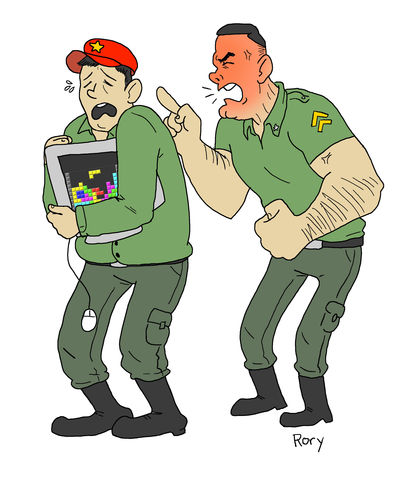It’s popular opinion that 1996 saw the publication of what became perhaps the best (though not the first) novel of and about the Internet era. Infinite Jest concerns, if only partially, the narrative of an entertainment cartridge (think hi-tech VHS tape) that, when viewed, compels the viewer to continue viewing forever, until they die. In its 1,000-plus pages this book makes up a complex and layered critique of entertainment and our addictive need for said entertainment that forces one to consider their own use of devices through which we derive recursive quantities of pleasure. More so today than in 1996, we have a semi-serious problem on our hands, especially with the Internet. As evidence to this point, consider the establishment of boot camp-style depositories in China, at which parents drop their Internet-addicted children.
Because this is no laughing matter, I’ll set the tone with a somber, true-life quote — a Chinese mother whose son had just been dropped at the facility said, through tears, “Our son’s addiction to the Internet is destroying our family.” Her son was then at Daxing, an Internet addiction treatment center, which has treated over 6,000 teenagers since its establishment in 2006, many of them unwilling participants. Upon arrival they are stripped of devices and placed in what we might call a purgatory of un-electronic space. They are forced to interact with their cohabitants and must participate in exercises developed to preemptively target the urge to use and abuse the vast and limitless stretches of the web. This therapy treatment is used primarily to dispel the lingering urge many of the habitants have to use the Internet. Abuse scandals aside, I think these camp-like detoxing facilities for over-involved Internet users are the best indication of a larger problem.
For these kids, internet use has produced a dependency on par with severe drug addiction. A video explaining the purpose of the semi-detention camps posits: “Researchers have found that heavy internet users suffer changes in brain functionality similar to those observed in drug abusers. And further studies have shown that withdrawal symptoms can be similar too.” The impact is not simply contained to the neurosphere. Patients—and I use this term consciously—are invariably prone to developing back and eye problems. They are more likely than less-intensive Internet users to commit juvenile misdemeanors (some cite the irreverent morality of violent video games as a cause). They, like heavy drug users, cause distress to their loved ones. In nearly every way imaginable, Internet addiction is one of the most problematic and devastating states of being a youth can find themselves in.
And this issue is by no means confined to China. There, the problem seems to congregate — if not originate — in the popularity of Internet cafés. Youths go to these cafés to spend their lives much like how at an arcade you’d spend a moderate number of quarters. In the United States, this problem might aptly be equated to the frequency and diligence with which we attend to our mobile devices, cell phones, tablets or laptops.
I understand that severe and debilitating addiction, like what you would find in a heroin addict, is not remotely the same as the recurring glances you might make at your email account five or six times a day. But for these kids in China the comparison returns more results than we should find comforting. When ample evidence suggests your brain, when addicted to the Internet, looks very similar to a brain that’s addicted to hard drugs, does this not suggest to heavy users of social media that they should tone it down a bit? Just like I wouldn’t recommend a daily dose of recreational drugs to a friend, I might just as effectively spend my time recommending that you be conscious of how much you use the internet.
This is not to say the Internet is bad or that it should cease to exist or that you mustn’t use your devices as often as you do. I wouldn’t dare suggest you spend less time on your phone. Rather, I think a healthy amount of skepticism must be collectively and consciously in place before we choose to pick up our phones. The Internet, in whatever guise it assumes, must be scrutinized for what it purports to give you. If you spend much of your day playing League of Legends, to the point that your life begins to sag under the weight of your webular neglect, a change may (should) be in order. I would also sheepishly advise that you don’t make social media or its infinite collection of funny and entertaining artifacts the main source through which you attain bouts of peace in your otherwise busy college life. If you turn to Facebook every time you have a down minute, how long will it take for you to become used to the prospect of being entertained, or at the very least occupied, for every minute of the day?
One might say that this article, informed by other articles on this big-bad-Internet, is nothing but an ironic proof against itself. You’d be right, and I’d feel just as bad for spending as much time as I have researching the web and occupying you in it.
So, I guess I have to go. As I do, though, why don’t you join me?

















